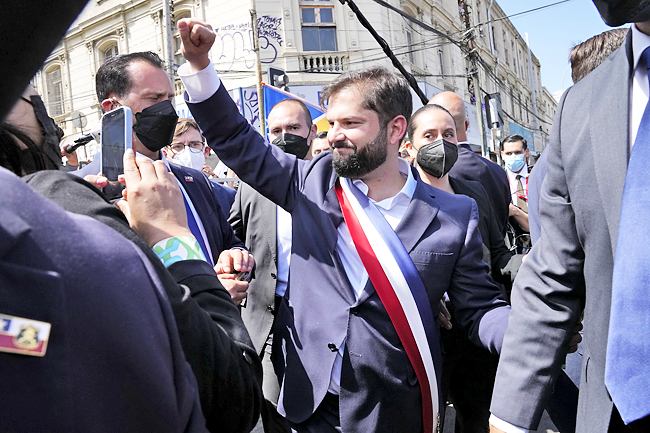SANTIAGO, CHILE (AP) – Left-leaning former student leader Gabriel Boric vowed to improve the lives of all Chileans and attack deep inequality that has sparked massive protests, hours after being inaugurated on Friday as the youngest president in the country’s history.
At 36, Boric was only four years old when democracy returned to the South American nation following a 17-year military dictatorship that both bloodied and set the groundwork for modern Chile.
Boric has vowed that his government will attack poverty and inequality that he said are the unacceptable underbelly of a free market model imposed decades ago by General Augusto Pinochet.
“We come to give ourselves body and soul to making life better in our country,” he said in a speech from a balcony of the government building, calling for unity.
“The road will undoubtedly be long and difficult,” he said.
His four-year term begins at a moment when a constituent assembly is drawing up a new constitution for the country to replace one adopted under Pinochet.

The Socialist Party leader of the Senate Älvaro Elizalde draped the presidential sash over Boric’s shoulders during the ceremony in the legislative chambers in the city of Valparaiso.
Soon afterward, Boric swore in the leader of a cabinet which includes 14 women and 10 men.
Boric won 56 per cent of the vote in a December runoff against conservative José Antonio Kast.
While his election initially scared investors, causing drops in stock prices and the peso, he has since stressed a pragmatic streak, vowing to maintain fiscal responsibility and naming a respected economist, former Central Bank President Mario Marcel, as finance minister.
“We are going to have to make the changes step by step because if not, the risk of falling back is too great,” he said recently – a stance that may be enforced by the fact his leftist coalition has only 37 of the 155 seats in congress. Even adding other centre-left parties, his allies fall just short of a majority.
Chile has long been seen as one of Latin America’s greatest economic success stories, bolstered by its vast mineral industries.
But it has been rocked over the past decade by large protest movements – some led by Boric – demanding better education, pensions and healthcare, as well as a more egalitarian distribution of wealth.


